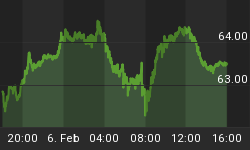Forget about the fiscal cliff. December's big story was the ascension of a new leader in Japan whose platform is aggressive inflation:
TOKYO -- Japan's incoming prime minister fired a volley into increasingly tense global currency markets, saying the country must defend itself against attempts by other governments to devalue their currencies by ensuring the yen weakens as well.
Shinzo Abe's call comes as others including Bank of England Gov. Mervyn King warn that the world's economic-policy makers risk becoming embroiled in currency spats that could heighten tensions among countries.
Mr. Abe on Sunday called on Japan's central bank to resist what he described as moves by the U.S. and Europe to cheapen their currencies and noted that a yen level of around 90 yen to the dollar -- it was at 84.38 in early Asian trading Monday, down from 84.26 yen late Friday -- would support the profit of Japanese exporters.
"Central banks around the world are printing money, supporting their economies and increasing exports. America is the prime example," said Mr. Abe, referring to the Federal Reserve's policy of flooding the market with dollars by purchasing massive amounts of Treasury bonds and other assets.
"If it goes on like this, the yen will inevitably strengthen. It's vital to resist this," he said.
Mr. King, in an interview this month, said, "I do think 2013 could be a challenging year in which we will, in fact, see a number of countries trying to push down their exchange rates. That does lead to concerns."
It was part of an effort by countries to preserve trade advantage, he said. "The policies pursued by countries for domestic purposes are leading to tension collectively."
What is notable about Messrs. Abe's and King's comments is that the scope of global currency angst seems to be expanding. China, which manages its exchange rate to keep it closely aligned with the U.S. dollar, has long been the object of global criticism for its efforts to hold down the value of its currency in an attempt to boost exports.
Since the financial crisis, other countries -- including Switzerland, Israel and South Korea -- have ramped up their efforts to prevent their own currencies from getting too strong amid worries about their export competitiveness. Policy makers in Australia also are under increasing pressure to fight the rise of the Australian dollar.
Global central bank foreign-exchange reserves expanded to $10.5 trillion by mid-2012 from $6.7 trillion in 2007, according to the International Monetary Fund, a 57% rise in less than five years and a sign of how aggressively world central banks are stockpiling other currencies in an attempt to prevent their own currencies from getting too strong in the wake of the 2008 financial crisis.
The largest increase has been in Switzerland.
It is "completely different" for Japanese companies if the dollar is in the 80-yen range, as it is now, as opposed to the 90s yen, Mr. Abe said. If the dollar "is above 85 yen, companies that haven't been paying taxes until now [because they don't have profit]. . .can pay taxes."
The U.S. hasn't explicitly sought a weaker dollar. But the effect of its policies has been to suppress its value. Most notably, the Federal Reserve's quantitative-easing programs -- in which the central bank prints dollars to purchase government bonds -- have the side effect of holding down the international value of the currency by increasing its supply in global markets.
Trade wars, in which countries restrict imports from other countries, were an important feature of Depression-era policies in the 1930s which crimped global economic growth. Mr. Truman said he had grown concerned that cooperation between countries on currency decisions had diminished in recent years.
If it continues, he said, then "you go from a world in which there is a broad level of cooperation on monetary measures to one in which it is every man for himself," he said.
Some thoughts
The crucial sentence in the above article is: If the dollar "is above 85 yen, companies that haven't been paying taxes until now [because they don't have profit]. . .can pay taxes."
There, in a nutshell, is why currency wars happen. Heavily-indebted governments are desperate for tax revenue, and an export sector that can't compete because of a strong currency produces very little taxable profit.
But before you write in to say that a strong currency is no barrier to profitable exports for well-run countries, note that "well-run" doesn't apply to today's developed world. Currency wars generally happen when corrupt, over-indebted countries can't cover their interest expense and start looking for a way to shift the burden of their stupidity onto their trading partners. A weaker currency is only a short-term fix, but when an election approaches (and one is always approaching), short-term fixes are good enough.
For a sense of the panic that's gripping Japan, consider what's happening to its big electronics exporters like Sony and Sharp:

A strong yen isn't the only reason for this implosion, of course. Apple and Google and falling TV prices are the real existential threats. But the Japanese central bank can't kill Apple and Google, while it can weaken the yen.
2013 is shaping up as a pivotal year, not necessarily because inflation is set to accelerate, but because virtually everyone who matters has decided to try, explicitly, to make it accelerate. This might take a while, because the ongoing contraction in Europe and failed US states like California and Illinois is profoundly deflationary. But with a few years' hindsight we might look back on December of 2012 as the beginning of the chaotic, parabolic stage of the process.















